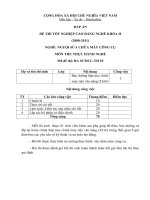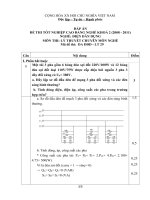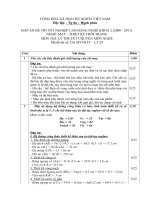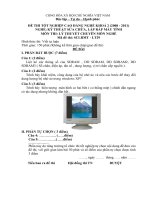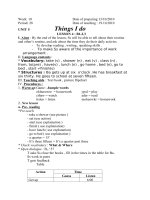PASSAGE 29
Bạn đang xem bản rút gọn của tài liệu. Xem và tải ngay bản đầy đủ của tài liệu tại đây (41.79 KB, 3 trang )
PASSAGE 29
Modern life is characterized not only by the conveniences made possible by technological advances but
also by greater mobility in search of still greater opportunities. These major life changes, however, expose
individuals to many novelties in a new culture, which are the causes of culture shock. Culture shock is a
process through which most people who enter a new culture pass through before they adjust to life in their
new environment.
Culture shock begins with the “honeymoon stage”. This is the period of time when we first arrive in
which everything about the new culture is strange and exciting. Unfortunately, the second stage “rejection
stage” can be quite dangerous because the visitor may develop unhealthy habits (smoking and drinking).
This can lead to the person getting sick or developing skin infections or rashes, which then makes the
person feel even more scared and confused and helpless. This stage is considered a crisis in the process of
cultural adjustment and many people choose to go back to their homeland or spend all their time with
people from their own culture speaking their native language. The third stage of culture shock is called
the “adjustment stage”. This is when you begin to realize that things are not so bad in the host culture.
You are becoming stronger by learning to take care of yourself in the new place. The fourth stage can be
called “at ease at last”. Now you feel quite comfortable in your new surroundings. You can cope with
most problems that occur. You may still have problems with the language, but you know you are strong
enough to deal with them. The last stage of culture shock, which many people don’t know about, is called
“reverse culture shock”. Surprisingly, this occurs when you go back to your native culture and find that
you have changed and that things there have changed while you have been away. Now you feel a little
uncomfortable back home. Life is a struggle!
Question 1. Which sentence best explains the main idea of paragraph 1?
A. Culture shock, experienced by people living in a new culture, consists of five basic stages.
B. People immigrate to other countries in search of better opportunities.
C. Modern life is characterized by many technological advances and greater mobility.
D. These major life changes are the causes of culture shock.
Question 2. It is stated that the “honeymoon stage” __________.
A. is involved in developing healthy habits
B. is exciting with the new sights, sounds, language and foods
C. is the initial period of culture shock
D. got its name because everything is new and exciting for the newcormer
Question 3. In paragraph 1, the word novelties probably means ________.
A. things which are new or unusual
B. things which are difficult to deal with
C. things which have to do with novels
D. things which are very young or recent in age
Question 4. In paragraph 2, the word host probably means _________.
A. the dominant country
B. the largest country
C. the newcomer’s native country
D. the receiving country
Question 5. Which of the following is NOT true according the passage?
A. At forth stage, newcomers have overcome all problems in the new culture.
B. Immigrants may suffer from “reverse culture shock” when going back to native culture.
Page 1
C. New arrivals in the second stage, “reject” the new culture by returning to their country or blinding
even more with other people from their culture.
D. The “rejection stage” is the most difficult stage in the process of cultural adjustment.
ĐÁP ÁN
1-A
2-C
3-A
4-D
5-A
LỜI GIẢI CHI TIẾT
Question 1:
Câu nào giải thích đúng nhất ý chính của đoạn 1?
A. Sốc văn hóa, được trải nghiệm bởi những người sống trong một nền văn hóa mới, bao gồm năm giai
đoạn cơ bản.
B. Mọi người di cư đến các quốc gia khác để tìm kiếm cơ hội tốt hơn.
C. Cuộc sống hiện đại được đặc trưng bởi nhiều tiến bộ cơng nghệ và tính di động cao hơn.
D. Những thay đổi lớn trong cuộc sống là nguyên nhân gây sốc văn hóa.
=> Dẫn chứng: These major life changes, however, expose individuals to many novelties in a new
culture, which are the causes of culture shock. Culture shock is a process through which most people who
enter a new culture pass through before they adjust to life in their new environment.
Dịch: Những thay đổi lớn trong cuộc sống, tuy nhiên, đưa các cá nhân đến nhiều điều mới lạ trong một
nền văn hóa mới, đó là nguyên nhân gây sốc văn hóa. Sốc văn hóa là một q trình mà hầu hết những
người bước vào một nền văn hóa mới đều đi qua trước khi họ điều chỉnh cuộc sống trong mơi trường mới.
Question 2:
Nó được tun bố rằng giai đoạn tuần trăng mật __________
A. có liên quan đến việc phát triển các thói quen lành mạnh
B. thú vị với những điểm tham quan, âm thanh, ngôn ngữ và thức ăn mới
C. là thời kỳ đầu của cú sốc văn hóa
D. có tên của nó bởi vì mọi thứ đều mới mẻ và thú vị đối với người mới
=> Dẫn chứng: Culture shock begins with the “honeymoon stage”. This is the period of time when we
first arrive in which everything about the new culture is strange and exciting
Dich: Sốc văn hóa bắt đầu với giai đoạn trăng mật. Đây là khoảng thời gian khi chúng tôi lần đầu tiên đến
nơi mọi thứ về văn hóa mới thật kỳ lạ và thú vị
Question 3:
Trong đoạn 1, từ “mới lạ” có nghĩa là ____.
A. những điều mới hoặc bất thường
B. những điều khó giải quyết
C. những điều phải làm với tiểu thuyết
D. những thứ còn rất trẻ hoặc gần đây trong độ tuổi
Question 4:
Trong đoạn 2, từ “host” có thể có nghĩa là _________.
A. quốc gia thống trị
B. quốc gia lớn nhất
C. người mới đến xứ bản xứ
D. nước tiếp nhận
Page 2
=> The third stage of culture shock is called the “adjustment stage”. This is when you begin to realize that
things are not so bad in the host culture. You are becoming stronger by learning to take care of yourself in
the new place.
Dịch: Giai đoạn thứ ba của cú sốc văn hóa được gọi là giai đoạn điều chỉnh. Đây là khi bạn bắt đầu nhận
ra rằng mọi thứ không quá tệ trong văn hóa chủ nhà. Bạn đang trở nên mạnh mẽ hơn bằng cách học cách
chăm sóc bản thân ở nơi mới.
Question 5:
Điều nào sau đây KHÔNG đúng theo đoạn văn?
A. Ở giai đoạn thứ tư, những người mới đến đã vượt qua mọi vấn đề trong nền văn hóa mới.
B. Người nhập cư có thể bị sốc văn hóa ngược lại sốc khi quay trở lại văn hóa bản địa.
C. Những người mới đến trong giai đoạn thứ hai, đã từ chối văn hóa mới bằng cách quay trở lại đất nước
của họ hoặc làm mờ mắt nhiều hơn với những người khác từ văn hóa của họ.
D. Giai đoạn từ chối là giai đoạn khó khăn nhất trong q trình điều chỉnh văn hóa ..
=> Dẫn chứng: The fourth stage can be called “at ease at last”. Now you feel quite comfortable in your
new surroundings. You can cope with most problems that occur. You may still have problems with the
language, but you know you are strong enough to deal with them.
Dịch: Giai đoạn thứ tư có thể được gọi là thoải mái . Bây giờ bạn cảm thấy khá thoải mái trong môi
trường xung quanh mới của bạn. Bạn có thể đối phó với hầu hết các vấn đề xảy ra. Bạn vẫn có thể có vấn
đề với ngôn ngữ, nhưng bạn biết bạn đủ mạnh để đối phó với chúng.
Page 3

